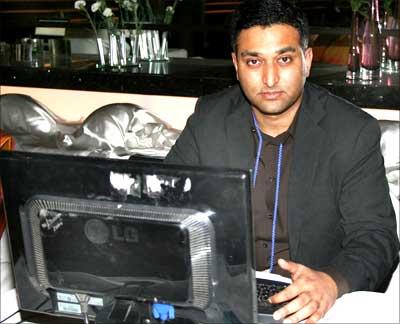|
| Help | |
| You are here: Rediff Home » India » Business » Pix |
|
 Dr Ramesh Raskar, associate professor at the Massachusetts Institute Technology's Media Lab, shows a very blurred photo of a car passing a street in Cambridge. He then zooms in on the car's license plate to show a further blurred view of plate and manufacturer's monogram. He asks the audience to guess the name of the manufacturer. It looks like the four circles of the Audi, and some of them say so much.
Dr Ramesh Raskar, associate professor at the Massachusetts Institute Technology's Media Lab, shows a very blurred photo of a car passing a street in Cambridge. He then zooms in on the car's license plate to show a further blurred view of plate and manufacturer's monogram. He asks the audience to guess the name of the manufacturer. It looks like the four circles of the Audi, and some of them say so much.
Dr Raskar pauses for a second and in a click reveals a high resolution shot of plate and monogram. The blurred and stretched shot corrects itself to a 'W' within a circle, the logo other famous German car manufacturer.
"An Audi going really fast is a Volkswagen," Dr Raskar says.
He was talking about future camera technologies that will change the world in the next few years at the EmTech India 2009 technology conclave in New Delhi.
Dr Raskar said the number of cameras in the world touched one billion in 2008. "The next billion cameras will be out by 2011. And it will change the social fabric of the world as a society," he said.
Some of the key technologies that the MIT Media Lab is working on are concepts like:
- Digital refocusing, which enables you to shoot first and then decide which part of the photo you want to focus on;
- Flutter shutter camera, where the shutter is not opened just once for a specific time frame as is done in cameras now, but flutters to give multiple shots within a same shot. The user can go back and tinker with the shot as he showed with the above car-in-the-street example;
- Cartoon camera, which helps in rendering high quality diagrams from poor images by cutting out the shadows and other irritants; and
- 6-D display.
Technologies apart, the fact that a billion more people are going to be armed with a camera in the next three years is going to have huge social impact, Dr Raskar said.
"There was a time between 1985 to the mid-1990s when computing power was with the chip. Then till 2005, the power was with network. We have now just entered a phase where the power will be with the people. People are the new computers," he said.
Explaining how this is happening and how it will shape up, Dr Raskar cited the example of a plane accident. "On September 3, Steve Fossett (businessman with a passion for aviation, who was the first person to fly around the world non-stop in a balloon) died in a plane crash and they couldn't find the wreckage initially. High-resolution images of the area were released and by September 11, some 50,000 people had pitched in and flagged potential spots for searching," he said.
Closer home, in India there is a village where women shoot documentaries and screen them on a weekly basis. "Only that village has no electricity!" he said. "Some women go around the village documenting the lives of people with a battery powered handycam and mike. They then screen the documentary in the weekends when the market place uses generators to power the weekly fair," he said.
While such incidents are on the rise already, the proliferation of cameras will affect a society at a far greater and significant level in the near future, Dr Raskar said, showing photos of security personnel muzzling a protestor.
"What is significant about this photo is it was taken by an Israeli and shows the human rights violation committed by the Israeli security forces. The main change that such technology will bring in terms of the social context is in working to help the society overcome denial within the system. Many societies, including India are in denial about their own systems. Take the Mumbai terror attacks, for instance: the channels covered it well, but they have an agenda. People would have had a lot more to know and understand had the same been done by people," he said.
In this context, in the coming years, every cell phone would become a TV station, the professor said. "When the next one billion cameras are out, most of it will be in the hands of people in the developing countries. And every cell phone will be an individual, transmitting television station. Imagine how these billion people will change the world."
Image: Dr Ramesh Raskar. | Photograph: Satish Bodas
| © 2009 Rediff.com India Limited. All Rights Reserved. Disclaimer | Feedback |

